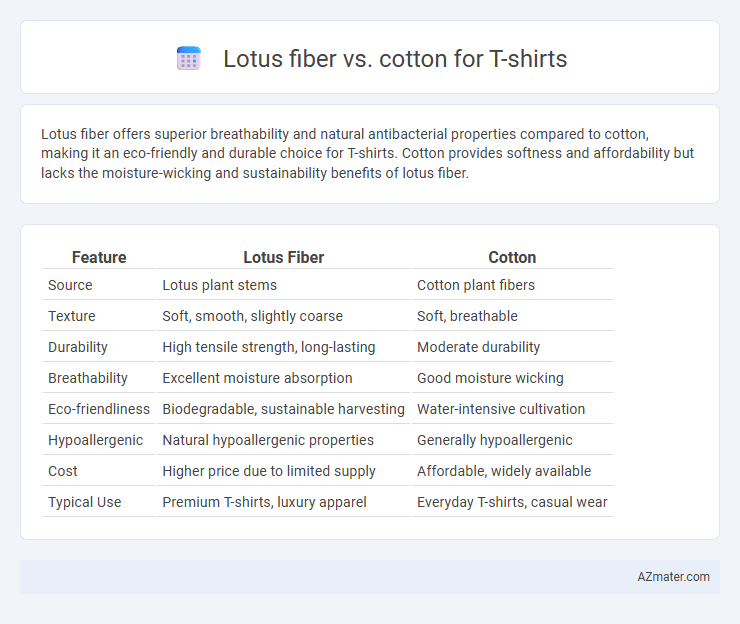Lotus fiber offers superior breathability and natural antibacterial properties compared to cotton, making it an eco-friendly and durable choice for T-shirts. Cotton provides softness and affordability but lacks the moisture-wicking and sustainability benefits of lotus fiber.
Table of Comparison
| Feature | Lotus Fiber | Cotton |
|---|---|---|
| Source | Lotus plant stems | Cotton plant fibers |
| Texture | Soft, smooth, slightly coarse | Soft, breathable |
| Durability | High tensile strength, long-lasting | Moderate durability |
| Breathability | Excellent moisture absorption | Good moisture wicking |
| Eco-friendliness | Biodegradable, sustainable harvesting | Water-intensive cultivation |
| Hypoallergenic | Natural hypoallergenic properties | Generally hypoallergenic |
| Cost | Higher price due to limited supply | Affordable, widely available |
| Typical Use | Premium T-shirts, luxury apparel | Everyday T-shirts, casual wear |
Introduction to Lotus Fiber and Cotton
Lotus fiber, derived from the stems of lotus plants, offers a sustainable and eco-friendly alternative to conventional cotton, known for its natural breathability and moisture-wicking properties. Cotton, sourced from the cotton plant's fluffy fibers, remains the most widely used material for T-shirts due to its softness, durability, and ease of dyeing. While lotus fiber provides a silky texture and antibacterial benefits, cotton excels in versatility and mass-market availability.
Origin and Production Processes
Lotus fiber originates from the lotus plant's stem, harvested primarily in regions like Thailand and Myanmar through a labor-intensive process of hand extracting fibers, soaking, and drying to create a lightweight, breathable fabric. Cotton is cultivated globally, especially in countries such as India, China, and the United States, involving mechanized harvesting, ginning to separate fibers from seeds, and spinning into yarn, making it a more widely available and mass-produced textile. The unique extraction and eco-friendly nature of lotus fiber contrast with the extensive agricultural and chemical inputs required in conventional cotton production.
Environmental Impact Comparison
Lotus fiber production for T-shirts has a significantly lower environmental impact compared to conventional cotton, requiring less water and avoiding harmful pesticides. Cotton cultivation consumes vast amounts of water and often relies on chemical fertilizers that contribute to soil degradation and pollution. Lotus fiber is biodegradable and harvested sustainably from lotus stems without replanting, making it an eco-friendly alternative.
Texture and Comfort Differences
Lotus fiber offers a unique silky texture that is lightweight and breathable, making it highly suitable for high-end, comfortable T-shirts. Cotton provides a soft, smooth feel with excellent moisture absorption, ideal for everyday wear and durability. While cotton is more elastic and easy to care for, lotus fiber stands out for its natural antibacterial properties and luxurious, crisp texture.
Durability and Longevity
Lotus fiber offers superior durability compared to cotton due to its naturally strong, stiff fibers that resist wear and tear, making it ideal for long-lasting T-shirts. Cotton fibers, while soft and breathable, tend to weaken and pill over time with frequent washing, reducing fabric longevity. T-shirts made from lotus fiber maintain structural integrity and shape far longer than conventional cotton, ensuring extended use and sustainability.
Moisture-Wicking and Breathability
Lotus fiber T-shirts exhibit superior moisture-wicking properties compared to cotton, rapidly drawing sweat away from the skin to enhance comfort during physical activity. The natural hollow structure of lotus fibers promotes excellent breathability, allowing air circulation that helps regulate body temperature effectively. Cotton T-shirts, while breathable, tend to absorb moisture and retain it longer, which can lead to a damp feeling and less efficient drying.
Allergen and Skin Sensitivity Factors
Lotus fiber T-shirts offer superior hypoallergenic properties compared to cotton, reducing the risk of skin irritation and allergic reactions for sensitive skin. The natural antimicrobial qualities of lotus fiber help prevent bacterial growth, which can exacerbate skin sensitivities. Cotton, while breathable, may retain moisture and allergens that trigger dermatitis or eczema in susceptible individuals.
Cost and Market Availability
Lotus fiber T-shirts typically have higher production costs due to the labor-intensive extraction process and limited fiber yield, making them more expensive than cotton alternatives. Cotton dominates the market with established supply chains and widespread availability, ensuring lower prices and easy access for mass production. The niche status of lotus fiber results in limited commercial availability, restricting its presence mainly to premium or eco-luxury apparel segments.
Style and Aesthetic Appeal
Lotus fiber offers a unique, natural sheen and a slightly textured surface that enhances the visual depth and sophistication of T-shirts, making them stand out in style and aesthetic appeal. Cotton provides a softer, matte finish that delivers classic, versatile looks adaptable to various fashion styles and color treatments. The distinctive luster and eco-friendly narrative of lotus fiber T-shirts often attract fashion-conscious consumers seeking sustainable yet stylish wardrobe options.
Conclusion: Choosing the Best Fiber for T-Shirts
Lotus fiber offers exceptional breathability, natural antibacterial properties, and environmental sustainability, making it ideal for eco-conscious T-shirt choices. Cotton remains popular due to its softness, durability, and wide availability, delivering comfort and ease of care for everyday wear. For the best T-shirt fiber, prioritize sustainability and performance needs: choose lotus fiber for premium eco-friendly wear or cotton for reliable and breathable comfort.

Infographic: Lotus fiber vs Cotton for T-shirt
 azmater.com
azmater.com